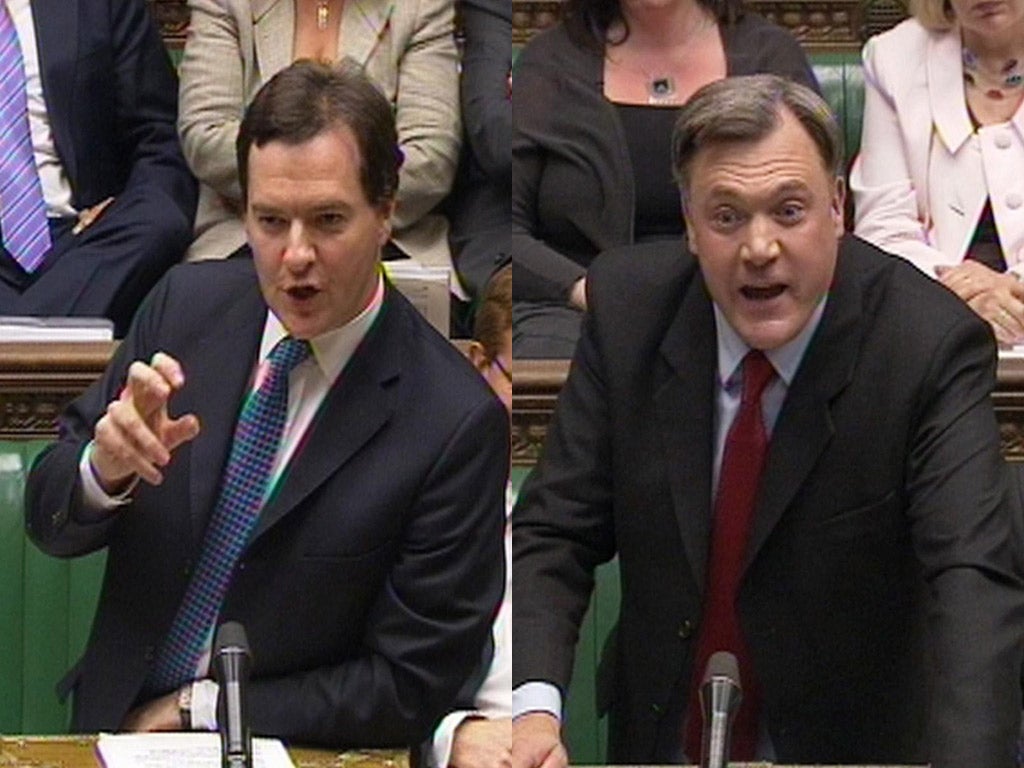John Rentoul: Osborne loses the battle on banks but wins the party war
The Chancellor is not stupid. He cynically turned a scandal about City boys into a reminder that his Shadow looks like a bully


George Osborne is neither a master strategist nor a bumbling idiot. Last week, he found his level. He is not bad, but he makes mistakes. The biggest being the tax cut for the rich announced in the Budget in March to take effect next year. But you do not get to be Chancellor of the Exchequer at the age of 38 by being an idiot. Or by being born into a rich family.
Many people thought he made another mistake last week in his bitter clash with Ed Balls, although the net effect was probably a Conservative win. The immediate verdict was that he had overreached himself in an interview in The Spectator, because of his obsession with the Shadow Chancellor, an obsession that he shares with David Cameron.
Osborne implied, if he did not assert, that Balls, as City minister, was "involved" in the inter-bank rate-fixing scandal. "One too many eggs in the omelette," admitted a Conservative insider. In one of the most heated and best attended recent Commons debates not featuring party leaders, Balls angrily demanded evidence or an apology.
Osborne provided neither and technically lost what he described, later that day, as a "cutting and thrusting debate with my good friend Ed Balls". But the Chancellor won the argument over the form of the inquiry into the banks. A judge-led inquiry was a silly idea. What matters is that there should be criminal prosecutions, after the British and American regulators have finished their investigations. Meanwhile, a parliamentary inquiry can look into the case for changes in the law.
What was important was that Nick Clegg stayed onside. The reason that the pointless Leveson inquiry was set up was that Clegg sided with Ed Miliband,and Cameron calculated, wrongly I think, that it was not worth the fight.
This time, Cameron held his ground, and Clegg saw no party advantage in backing Miliband's demand for another Leveson-style provider of day-time television. Partly because Vince Cable, the Lib Dem Business Secretary, had already commissioned an independent inquiry, headed by Sir John Vickers, into the banks.
The coalition faces a stiffer test on Tuesday with the vote in the Commons on House of Lords reform. But that is a different matter. The proposed model of Lords reform is a terrible idea. Few people, not even most Liberal Democrats in the privacy of their own homes, think that senators elected for 15-year non-renewable terms on closed party lists offer meaningful democracy. I am not sure how Lords reform will expire this time round, but feel that it will, simply because there is not a strong enough argument for it.
Clegg's attempt to take the boundary review hostage in exchange for Lords reform, made explicit by his adviser Richard Reeves on Friday, is counter-productive. Tory MPs will feel even less inclined to support Lords reform now. But Lords reform hardly matters to anyone, while the boundary changes, equalising constituency electorates and cutting the number of MPs from 650 to 600, matter greatly to Cameron. The new boundaries are worth a 20-seat advantage to the Conservatives over Labour.
MPs will not vote on the boundary changes until next year, I am told, but when it comes the Prime Minister will exploit the power imbalance between coalition partners. If the Lib Dems vote down the new boundaries, says one source close to Cameron, the coalition would be over. "It is not our red boxes that will go." Regardless of what happens to Lords reform this week, when it comes to the boundaries decision, I suspect that Clegg and his colleagues will vote to stay in ministerial office rather than face an early general election, even on the existing boundaries.
That, though, is a question for another day. Last week was about the struggle between Tories and Labour on the economy. On that, unfair as it may be, making Ed Balls the centre of attention is a Tory gain. Balls may have been right about the economy, and he may be charming in person, but he reminds the voters of what they didn't like about Gordon Brown's era, and he looks like a bully on television – even if viewers caught a glimpse of his other side in Thursday's debate when he blew a kiss to Tory MP Anna Soubry.
The bank scandal is dangerous for the Conservatives, certainly. It could simply have been a story about bad behaviour by the Tories' friends in the City. That would have been another reason for Cameron to regret another of his misplaced decisions to go against his instincts. He did not want to cut the 50p-in-the-pound top rate of income tax, aware that it would retoxify the Tories as the party of the rich, but he allowed Osborne to persuade him that it was more important to lift the yoke on wealth-creators.
So Osborne was utterly cynical in provoking a row with Ed Balls, but effective in reminding us that Labour was in charge at the time the inter-bank rate was manipulated. A story that could simply have been about the Tories' rich friends in the City, became one about Labour's weakness in regulating predatory cheats.

Join our commenting forum
Join thought-provoking conversations, follow other Independent readers and see their replies